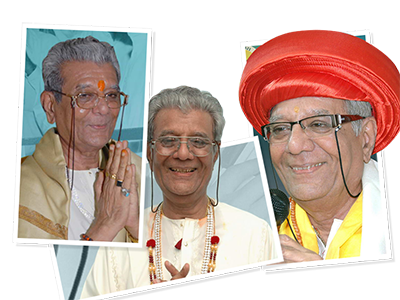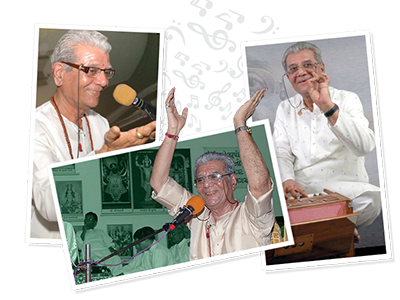


Na bhooto, na bhavishyati… (“Neither in the past nor in the future”) Neither in the past and perhaps, nor in the future will such a great incarnation of love, wisdom and compassion as Akram Vignani Dada Bhagavan descend on this earth! And one of the incomparable wonders of Sri Dada Bhagavan’s Holistic Vision is none other than Sri Kaviraj Navneet Sanghvi!
Kaviraj Sri Navneet was born on 21st July, 1934 in Mumbai to mother Surajben and father Sri Gokuldas Muljibhai Sanghvi. Incidentally, his wife Damayantiben shared his birthday, and was born on 21st July, 1939.
Navneet did not receive any formal training in music from singers or musicians. The seeds of music were sown in him when he started listening to devotional songs in the Derasar temple from a young age of five. He used to accompany his father to the Derasar temple every day, listen to the ‘stavans’ (devotional hymns) there, and sing them after coming home. He learned to play the harmonium at the age of 12, after seeing and hearing musicians play on their instruments.
Navneet was not much interested in studies and discontinued schooling before matriculation. In addition to music, he loved painting and traveling. He had painted nearly thousand pictures and landscapes by the age of 14. He also started singing at public performances from the age of 14.


When Navneet was a teenager, he became interested in the film industry. By the time he was 18, he was visiting studios or the homes of reputed singers and musicians from the industry, to take their autographs or a photograph with them. He also got a chance to closely observe how recording is done. Once, the great musician Ghulam Mohammad advised him to continue his interest in music, but to not dream of being a music director. That made Navneet disillusioned with the film industry.
In 1953, he accompanied a cyclist from London who was on a tour of India. During this tour he met Sri Vinobaji, Khan Saheb Allaudiya Khan and Sri Omkarnath Thakur, considered as gems in the world of music. He also met actor Ashok Kumar and his brothers. He even came in contact with several Hindi Poets.
In 1955, for the first time, he organized a week-long Navratri Festival program in Kolkata, in which songs, music and plays were staged. The famous magician K. Lal even gave a performance with him.
Navneet primarily earned his living working as an accountant. But every morning and night, he sang devotional songs at Sarvodaya Hospital, Ghatkopar, from 1955 to 1965. He is the first person to organize a conference of Gujarati singers and musicians, which was held at the Hospital, in 1958.

When Dada Bhagavan came for satsang at his sister Liliben’s house at Matunga, in the first week of April, 1969, Kaviraj had a darshan of him, for the first time. Navneet is said to have told Dada, “I only know how to sing but I am a zero in worldly affairs or ‘Gyan’ (Knowledge).” Dadaji requested him to place his head on the big toe of Dadaji’s foot, and performed vidhi, or a ritual. Thereafter, Dadaji’s lotus face remained before Kaviraj’s eyes for nearly 72 hours. Navneet assumed that Dada Bhagavan must be in a unique, spiritual state. Thereafter, Navneet started visiting Bhagavan every now and then.
He was initiated into ‘Nij Swaroop Gyan’ (true revelation of the Self) on 17th May, 1969 by Dadaji, who placed his hand on Navneet’s head and blessed him saying, ‘The Goddess Saraswati herself will dance on your tongue.’
Thereafter, whenever he heard Dadaji’s speech, a new ‘pada’ (poem) would flow from him. The first such ‘pada’ was ‘Andhara koti varshna...’. Just as iron becomes gold at the touch of an alchemist’s stone, Navneet, an ordinary man was transformed into a poet ‘Kaviraj Sri Navneet’.

The stream of padas, or ‘Goddess Saraswati herself’ in her manifestation, started flowing from the tongue and pen of Kaviraj Navneet all through the day, whether he was resting, rising, eating or drinking.
Sometimes, Kaviraj himself did not understand what he wrote, till Dadaji explained to him it’s meaning and significance.
Nearly 150 ‘padas’ were written in a short span of six months. The first compilation of 108 such padas was called ‘Mukti-Sukh series-I’ and published in 1971.
Subsequently 11 such Mukti-Sukh series called by various names such as ‘Mukti-Sukh Sanchayan’, Sat-rangini’, Nav-nityam’, Swarvadini: Saptak 1 to 8’ have been published. One can also find cassettes, CDs and DVDs of these series.
In 1970, he travelled for the first time with Dada Bhagavan on a pilgrimage tour of Ranakpur, Keshariyaji, Ambaji, Vadva etc. While having darshan of Rushabdevji at Keshariyaji, he automatically burst into the pada ‘Dada Bhagavanna Aseem Jai Jaikar ho’ hearing which Dadaji uttered, ‘Kaviraj, you have immensely benefited the world by singing this.’ He also accompanied Dadaji on a satsang tour of USA in 1982.
Kaviraj Navneet’s padas, stavans and devotional songs are the blessings of a Gnani Purush or the fruit of an enlightened Master’s grace. His sublime imagination brings the light of wisdom, and dispels the darkness of ignorance from the minds of an ailing mankind.
His hymns on Dada Bhagavan touch one’s heart deeply, and those who are thirsting for peace or bliss are transformed, both from their inner being and their outer personality.
His padas speak for themselves and give us spiritual bliss, making our lives happy, peaceful and harmonious. Kaviraj’s padas will be read, and sung for a very long time; as his imagination has been blessed with ‘Divya Tej’ or ‘immortal light’, a spiritual gift from his enlightened Master - Dada Bhagavan.
Kaviraj Navneet’s padas, stavans and devotional songs are the spiritual gifts of ‘Shukla Dhyan’. They are full of love and devotion for Dada Bhagavan, whose love was so vast that the whole world could take refuge in that one heart of his.
It has been said about Kaviraj that, ‘Akram Vignani, Sangameshwar, revered Sri Dada Bhagavan showered such blessings on Kaviraj that mother Sharda herself came and took an eternal seat in the temple of Kaviraj’s heart. Kaviraj too gave shape and words to her inner voice, for the welfare of mankind”.
Kaviraj’s padas balance Vyavahar (worldly life) and Nischaya (the pure self) as directed by Akram Vignani, and lead aspirants to final liberation. The purifying inspiration of the poet’s padas gives a boost to human efforts and keeps the flame of awakening burning. It keeps one steady in Nischay, and confers Gyan that illuminates Nischay, and removes hindrances or obstacles (Antaray) on the journey towards the self, wherein every attachment leads to detachment.
Kaviraj was indeed fortunate to come in contact with an enlightened and spiritual Alchemist like revered Dada Bhagavan himself. In turn, he bestowed complete devotion on Bhagavan. This caused a sea-change in his inner being that made him a poet, who sang the glories of Dada’s Akram Vignan that was hitherto unknown or unheard of. Thereby, Kaviraj became an instrument that drew aspirants’ souls to Dada Bhagavan, so that they could be initiated and blessed with spiritual wisdom, paving their way to liberation.
A creator, a singer, an interpreter, and a composer of music, Kaviraj is a multifaceted genius and a unique gift of Dada Bhagavan’s blessings.